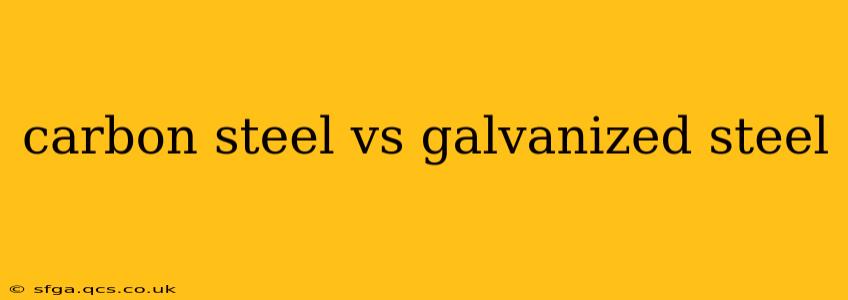Choosing the right steel for your project depends heavily on the application and environment. Understanding the differences between carbon steel and galvanized steel is crucial for making informed decisions. This guide will delve into the properties, applications, and pros and cons of each, helping you determine which option best suits your needs.
What is Carbon Steel?
Carbon steel is an iron-carbon alloy, with carbon being the primary alloying element. The carbon content determines its properties, influencing its strength, hardness, and weldability. Higher carbon content generally translates to higher strength and hardness but can reduce ductility (ability to deform without breaking) and weldability. Carbon steel is relatively inexpensive and readily available, making it a popular choice for numerous applications.
What is Galvanized Steel?
Galvanized steel is carbon steel that has been coated with a layer of zinc. This zinc coating protects the underlying steel from corrosion, significantly extending its lifespan, especially in outdoor or humid environments. The process of applying the zinc coating is called galvanizing, and it can be done through hot-dip galvanizing or electro-galvanizing. Hot-dip galvanizing provides a thicker, more durable coating than electro-galvanizing.
Carbon Steel vs. Galvanized Steel: Key Differences
| Feature | Carbon Steel | Galvanized Steel |
|---|---|---|
| Base Material | Iron-carbon alloy | Carbon steel with zinc coating |
| Corrosion Resistance | Low | High |
| Strength | Varies depending on carbon content | Similar to base carbon steel |
| Cost | Generally less expensive | Generally more expensive |
| Weldability | Varies depending on carbon content | Can be welded, but requires care |
| Appearance | Typically dark gray/black | Silvery gray |
| Lifespan | Shorter in corrosive environments | Longer in corrosive environments |
What are the advantages of carbon steel?
- Cost-effective: Carbon steel is generally cheaper than galvanized steel.
- High strength: Depending on the carbon content, carbon steel can offer exceptional strength.
- Excellent weldability: Certain grades of carbon steel are easily weldable.
- Widely available: It's readily available in various shapes and sizes.
What are the disadvantages of carbon steel?
- Susceptible to rust: It's prone to corrosion in humid or wet environments.
- Requires protective coatings: Often needs painting or other coatings to prevent rust.
- Limited lifespan in harsh conditions: Its lifespan is significantly reduced in outdoor or corrosive environments.
What are the advantages of galvanized steel?
- Corrosion resistance: The zinc coating provides excellent protection against rust and corrosion.
- Longer lifespan: It lasts significantly longer than carbon steel in harsh environments.
- Low maintenance: It requires minimal maintenance compared to carbon steel.
- Durable and strong: It retains the strength of the underlying carbon steel.
What are the disadvantages of galvanized steel?
- Higher cost: Galvanized steel is more expensive than carbon steel.
- Zinc coating can be damaged: The zinc coating can be damaged during handling or fabrication.
- Weldability concerns: Welding galvanized steel requires special precautions to prevent zinc fumes.
- Appearance: Some may find the silvery-gray appearance less aesthetically pleasing than painted carbon steel.
When should I use carbon steel?
Carbon steel is ideal for applications where cost is a primary concern and corrosion is not a major factor. Examples include:
- Interior structural components: Where protection from the elements isn't critical.
- Components within enclosed systems: Protected from moisture and weather.
- Certain industrial applications: Where the environment is controlled.
When should I use galvanized steel?
Galvanized steel is the better choice when corrosion resistance is paramount. Ideal applications include:
- Outdoor structures: Fencing, roofing, and building exteriors.
- Marine applications: Where saltwater corrosion is a significant concern.
- Automotive parts: Exposed to weather and road salt.
- Piping and ductwork: Handling water, chemicals, or other corrosive substances.
How does the galvanizing process affect the strength of steel?
The galvanizing process minimally affects the strength of the underlying carbon steel. The zinc coating itself is relatively soft and doesn't significantly contribute to the overall strength.
Is galvanized steel recyclable?
Yes, galvanized steel is recyclable. However, the zinc coating may require separation during the recycling process.
This comparison should provide a solid foundation for choosing between carbon steel and galvanized steel for your specific project. Remember to consider the environmental conditions, budget constraints, and desired lifespan when making your decision.
